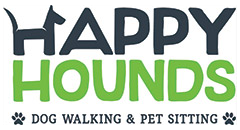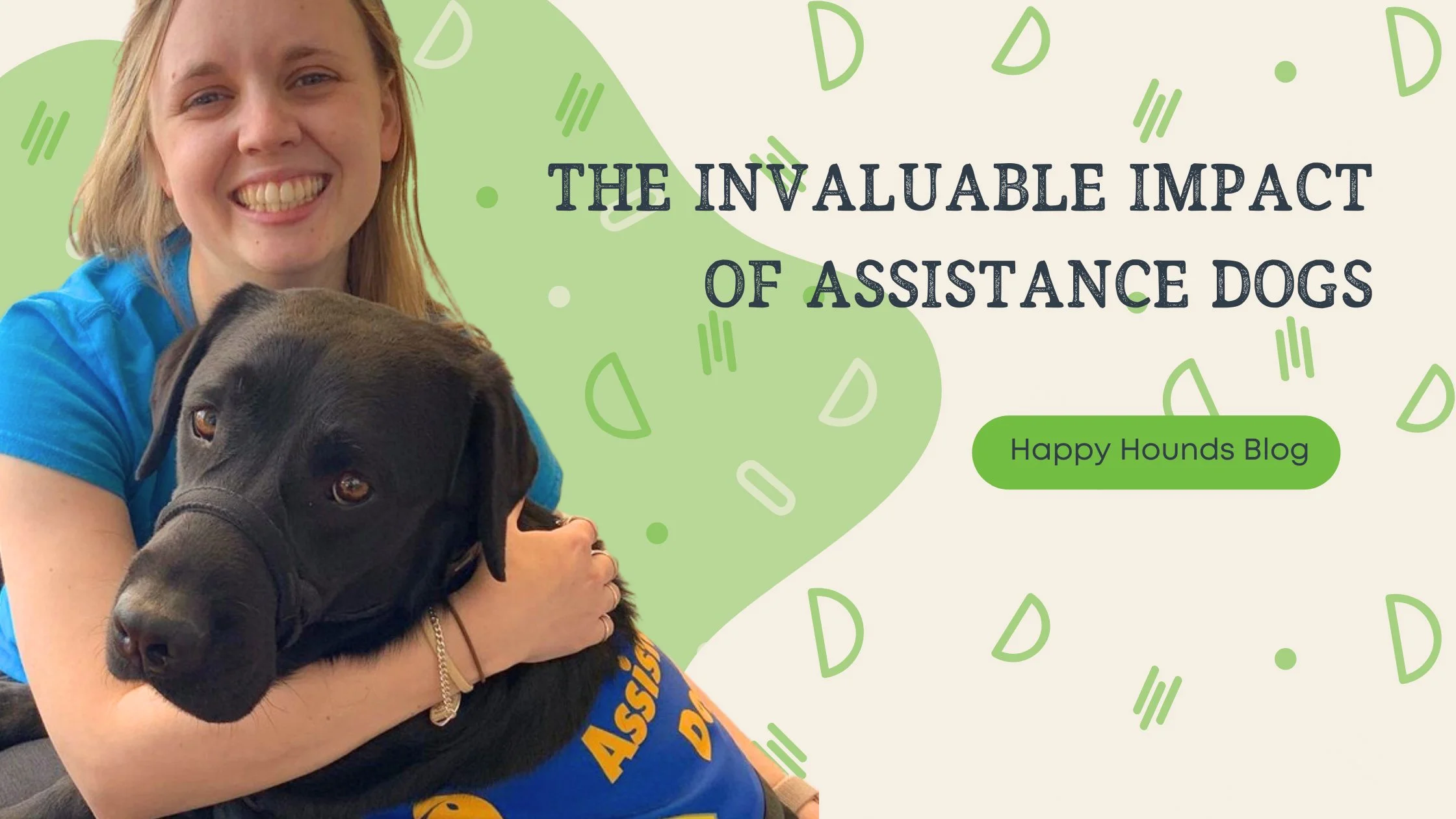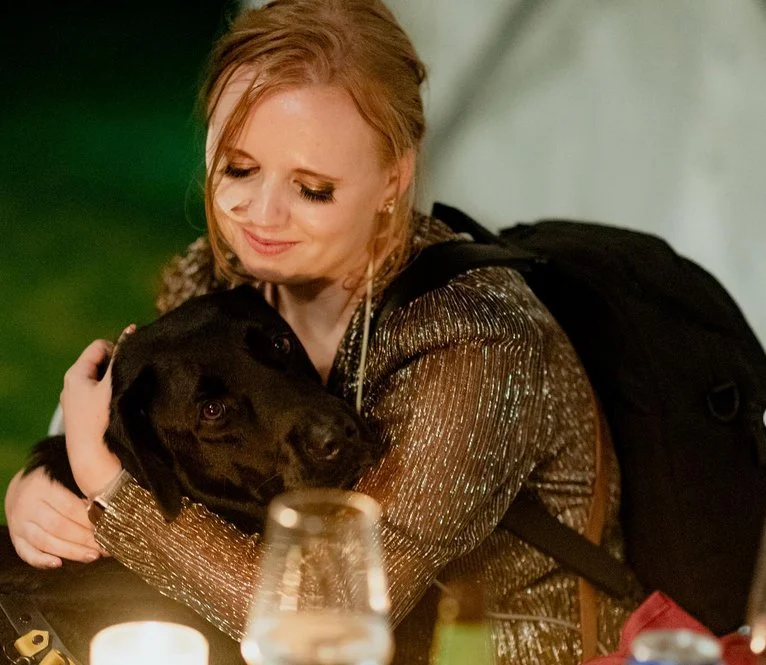The Invaluable Impact of Assistance Dogs: Introducing Ruth And Ernie
Assistance dogs are not just four-legged companions. They are highly trained animals that provide invaluable support and assistance to individuals with disabilities or specific needs. These incredible canines go beyond traditional pet roles, offering a unique and life-changing partnership that enhances independence and overall well-being.
The Happy Hounds Team are privileged to be able to meet and care for some of these little super-heroes and after noticing a few instances in the media of discrimination against people with disabilities and their service dogs, we’d like to take this opportunity to shine a light on just how amazing and invaluable assistance dogs can be. With this in mind, we’d like to introduce you to a wonderful client of ours, Ruth and her assistance dog, Ernie.
Hi Ruth, thank you for taking the time to share your story with us. Please tell us a little bit about yourself and Ernie!
Hi, I’m Ruth - I am a full-time working occupational therapist, I work primarily with participants within the National Disability Insurance Scheme. My partner in crime is Ernie, a 6 year old black Labrador. Ernie and I have been paired together as a working team for coming up on 4 years. There is yet to be a day in those 4 years that we’ve been separated.
Can you share a little about your personal journey and how you came to have an assistance dog?
Before Ernie, I was a different person and my life looked incredibly different. I was attempting to complete University studies while I was being admitted to hospital on a monthly basis. I was unconscious close to daily and doctors didn’t have all the answers to my medical issues.
I have numerous diagnoses including a genetic disorder that affects my entire body. Despite using my wheelchair and mobility aids, I was losing independence quickly. My family expressed concern frequently about my safety. Leaving the house alone often resulted in being admitted to hospital.
During this time, I was lucky enough to have good friends to help me. One of my friends who has a condition similar to mine, had her own assistance dog and attempted to do the job for us both. This is was what made me think that an assistance dog may be the answer we’d been searching for. My doctors thoroughly agreed it would increase my ability to be safe while living independently.
From there on, there was lots of paperwork and planning, nor had I ever owned a dog. At that time, I did not have the tools to keep myself out of hospital, let alone train a dog.
I waited for Ernie’s placement for over a year with no idea what 4 legged partner would come through the door. When Ernie and I first met, we both knew it was right! We completed a ‘trial weekend’ to confirm that the placement and our personalities would work together. Ernie never left that trial placement and has been with me since!
I was privileged enough to receive Ernie through a wonderful company named Canine Helpers for the Disabled. The company is a non-for-profit and Ernie’s training was only possible by the donation of members of the community. Ernie himself was donated to the program by Sharon Bamford, the owner and operator of BAMGYPS Kennels, a kindness and generosity I could never repay. Their generosity gifted me my independence.
What support does Ernie provide you with on a daily basis that you consider most valuable?
Some of Ernie’s most valuable tasks are his medical alerts. Ernie is a cardiac and diabetic alert dog. Due to Ernie’s natural ability to detect changes in my body, I was able to get diagnosed with a rare form of diabetes that the doctors couldn’t explain before Ernie.
Ernie’s other most used tasks are item retrievals, often used because of how often I drop things or forget to bring items into the room. Ernie can go and collect my phone or other items from anywhere in my home or workplace, which is often a lifesaver for my safety and energy levels.
How has having an assistance dog impacted your independence and overall quality of life?
Having an assistance dog has changed my life completely. I was previously being admitted to hospital frequently when attempting to complete daily tasks and it being unsafe to go anywhere alone. I am now living in a different city than my family, working full-time, joining in multiple dog sports and living a very full life. Ernie has allowed me to become the person I always was without the limitations of my disability.
What was the process for adopting Ernie into your family? Was there a lot of training required? Are there significant hurdles or is it a fairly straightforward process?
For me, the process was to collect application forms and have the endorsement and paperwork from my doctors and specialists. The paperwork was based on myself; my personality, lifestyle and weekly schedule, so they could pair me with a dog that would fit with my activity level and personality.
It was a fairly straightforward process. Though, there are a couple different avenues for obtaining an assistance dog, having a doctor’s endorsement and some paperwork confirming your eligibility and disability which would allow you to have an assistance dog, are a necessity for both.
What considerations should you be aware of before going through the process of acquiring an assistance dog?
I think the biggest consideration before getting an assistance dog is the commitment. These dogs spend 24 hours a day with you, and although you have your own disabilities, you are solely responsible for making sure their needs are fulfilled. That means ensuring that they’re cared for, groomed, exercised and healthy. However you go about being able to maintain that, it’s still your responsibility.
We’ve been hearing a lot in the media about people with assistance dogs experiencing discrimination. Do you experience negative interactions in relation to your disability or in relation to your use of Ernie as an assistance dog?
There is unfortunately is a lot of discrimination within society for those using all types of assistance dogs, but also for those with disabilities. I experienced discrimination before I got Ernie due to my disability and I still experience discrimination with him.
It takes extra time to do simple tasks when preparing to travel, simply because airlines and other methods of public transport are uneducated on assistance dog rights.
I’ve grown very used to advocating for myself and have learnt the required avenues to resolve issues as I face them. Although, not many people understand the emotional toll it takes completing simple tasks that everyone else can do without a second thought.
What would you like people to be more mindful of when they come across someone who has a disability and requires the use of an assistance dog?
Something that people should be mindful of when seeing a person with an assistance animal in public, is don’t distract the animal in any way. Most people know not to pat these animals but most don’t know bending down to look at them, talking to the animal, making noises and calling out to them is just as distracting.
Bear in mind how you, yourself, would react when someone is calling out your name - you would turn around and look to who is asking for your attention. Although these dogs are well trained, that doesn’t mean they’re perfect. Don’t make their job harder because you can’t control yourself.
Is there anything else you would like to share about your relationship with Ernie and your experience with the public and accessibility?
Overall, assistance dogs are brilliant tools. They bring independence, joy, laughter and so much companionship. They have the power to change a life and open doors that can feel completely closed off - but they take work.
Don’t ever discredit a disabled individual learning or training their dog or animal. Let the disabled individual speak for themselves. If we’re empowered to speak for ourselves, to use the tools we require to integrate with society, just imagine how the world could altogether change for the better.
You can follow Ruth and Ernie’s experiences and adventures on instagram →





